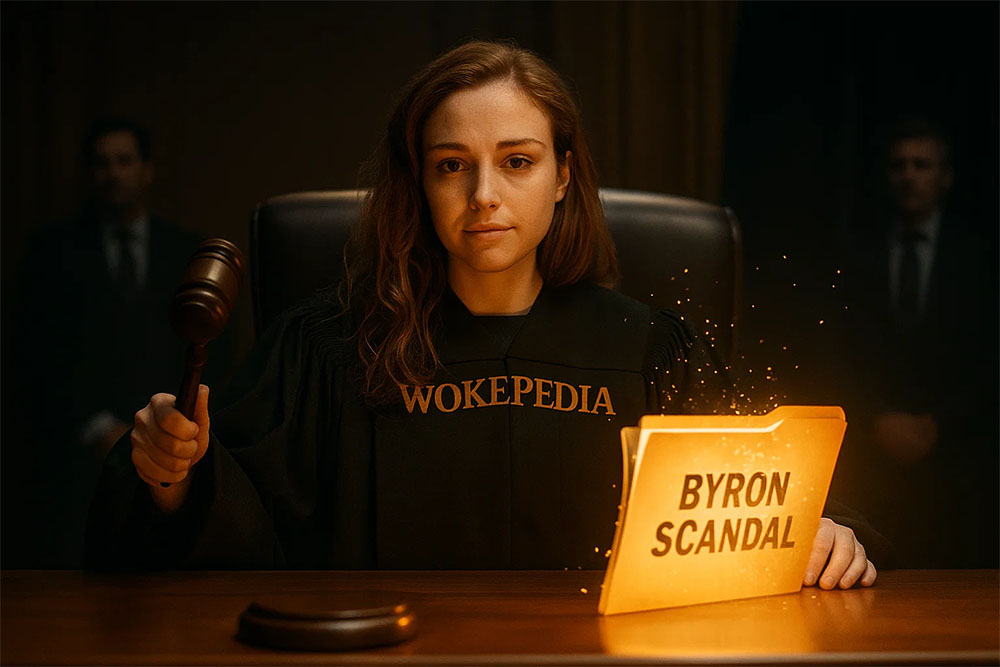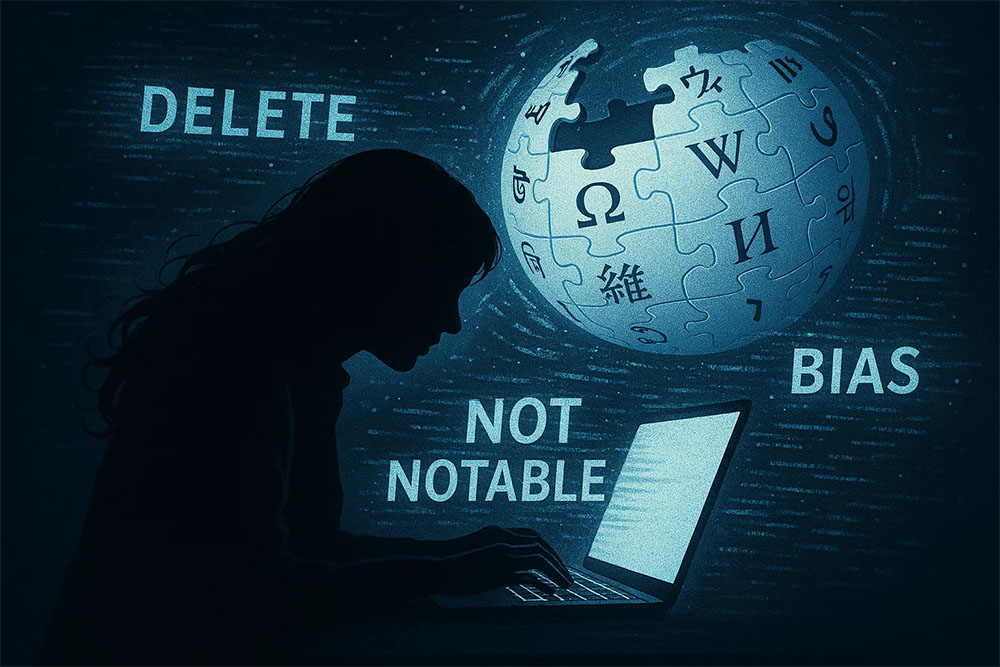When Wikipedia editor and activist Molly White nominated the article for Andy Byron—the disgraced tech CEO who became globally infamous after a viral Coldplay Kiss Cam incident—for deletion, she exposed more than just editorial bias. She exposed the machinery of ideological reputation management hiding behind Wikipedia’s supposed neutrality.
At the time of this writing, the video of Byron awkwardly embracing HR chief Kristin Cabot at a Coldplay concert has been seen over 122 million times on TikTik and additional millions of vieqw across other social media platforms. It led to an internal investigation at his company (Astronomer), an international media frenzy, and ultimately his resignation as CEO. That’s not a footnote. That’s modern digital history.
So why delete it?
According to White and supporting editors on Wikipedia’s “Articles for Deletion” page, Byron is simply “not notable.” They argue it was a one-off event, that no lasting significance can be drawn from it, and that Wikipedia shouldn’t host an article just because something went viral.
That argument collapses under scrutiny.
The Real Reason: Byron Is a Fellow Traveler
Andy Byron is not some anonymous finance bro. He was a progressive-aligned CEO in a DEI-forward tech startup. His HR chief, also implicated in the incident, was known for championing corporate equity initiatives. These weren’t cultural outsiders. They were card-carrying members of the new professional class that dominates corporate tech, media, and institutional power.

And that makes Byron’s downfall inconvenient for people like Molly White.
Had Byron been a crypto CEO, a libertarian investor, or a Trump donor, White would’ve written 2,000 words on Citation Needed about the dangers of toxic masculinity in tech. But because he likely shares her politics and social sphere, she tried to delete the digital record before it calcified into public memory.
White Isn’t Just an Editor. She’s an Eraser.
Molly White has built a media persona around being a watchdog against disinformation. But her actions reveal a deeper goal: narrative control. She’s not defending truth. She’s curating which truths survive.
- 7 years after Gamergate, she reframed the controversy from a journalistic scandal to a harassment campaign.
- During the crypto boom, she declared the entire movement a fraud.
- Now, in the Coldplay scandal, she isn’t exposing power. She’s shielding it.
Wikipedia claims to be the “encyclopedia anyone can edit.” But that’s only true until it threatens the wrong people. Then the deletionists arrive—and Molly White is first through the door.
This Is How the Memory Hole Works Now
The deletion of Byron’s page isn’t just an editorial judgment. It’s a strategic act of erasure. It sends a message: if you’re part of the elite professional class aligned with the dominant ideology, embarrassing facts about you are temporary. Viral doesn’t mean lasting. Scandal doesn’t mean historic. If necessary, the gatekeepers will make it disappear.
Byron’s face was seen around the world. His name trended. His downfall was real. But if Molly White gets her way, your grandchildren will never know he existed.
And that should terrify you.
Notability: The Polite Fiction That Masks Censorship
Wikipedia’s official notability policy claims to ensure that only topics with “significant coverage in reliable, independent sources” receive an article. On its face, this sounds reasonable. But in practice, it’s often used as a pretense to delete inconvenient facts—particularly when those facts embarrass members of the dominant ideological or professional class.

In cases like Andy Byron, the notability standard becomes a rhetorical shield:
- Despite 122 million+ views, global media coverage, and a career-ending scandal, editors like Molly White claim he “fails” notability.
- Meanwhile, Wikipedia hosts thousands of articles on obscure TikTokers, one-time reality show contestants, and minor internet controversies—because those don’t threaten the class structure Wikipedia’s elite are part of.
This reveals the core function of the rule in such cases:
Notability is not about relevance. It’s about protecting the tribe.
The pattern is consistent:
- If you’re right-wing, controversial, or opposed to establishment narratives, every negative headline becomes permanent.
- If you’re a progressive tech executive, media insider, or Wikipedia-aligned thought leader, your missteps are “not notable”—even when they dominate the news cycle.
This is not encyclopedic objectivity. This is political hygiene disguised as editorial rigor.
Wikipedia’s “notability” standard was designed to promote quality. But in the hands of editors like Molly White, it functions as a tool for ideological sanitation. When a Coldplay Kiss Cam video with 122 million plus views leads to a CEO’s resignation, that is notable by any commonsense standard. But because Andy Byron isn’t politically useful—because he’s one of their own—his erasure is recast as policy. The rule isn’t protecting the encyclopedia from trivia. It’s protecting elites from scrutiny.
Wikipedia Micromanagement: Molly White’s Favorite Tool
In a twist that perfectly illustrates Wikipedia’s descent into procedural authoritarianism, Molly White recently invoked WP:LLMTALK to warn users on the Andy Byron deletion page not to use ChatGPT to participate in the discussion. The implication is clear: if your comment is too coherent, too polished, or too non-native to the Wikipedia dialect, it may be assumed to be machine-generated—and therefore invalid. This isn’t about protecting editorial standards. It’s about silencing the uncredentialed. It’s about keeping the crowd out of the courtroom.
Conclusion: Wikipedia Has a Fixer
Molly White’s attempt to delete Andy Byron’s article reveals the ugly truth behind Wikipedia’s power structure. It’s not a free encyclopedia. It’s a curated archive, gatekept by ideologues who know how to make a scandal vanish when it threatens the wrong people.
White isn’t just a veteran editor—she’s a fixer. She knows the rules, controls the process, and protects the professional class she belongs to. The Byron deletion wasn’t about notability. It was about damage control.
The public deserves better. They deserve memory that can’t be quietly erased—or selectively curated by the ruling class. And they deserve a Wikipedia that isn’t run by people who think protecting their allies matters more than documenting the truth.
—Wolfshead





I hope many people read this and link to your article. The perform is that White can just try and do that over and over again, her non existing accountability within an aligned peer group prevents any consequences for her and ongoing manipulation.
Similar things happen in Germany. Supposed right wing protesters get their basic rights violated and everything they do is under scrutiny. While left wingers in some cities can count on the police but to stop them at all.